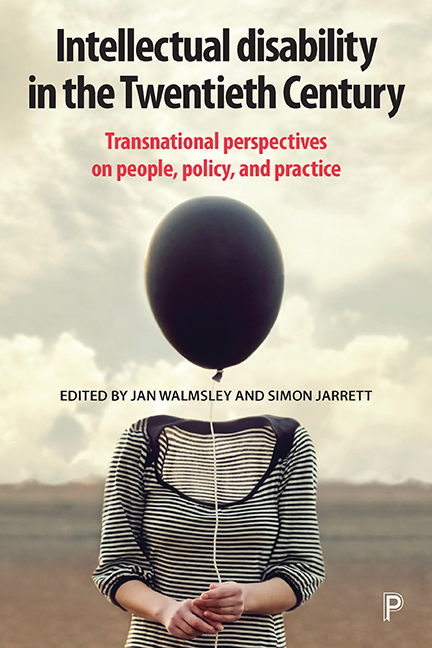 Intellectual Disability in the Twentieth Century
Intellectual Disability in the Twentieth Century Book contents
- Frontmatter
- Contents
- Notes on editors and contributors
- Introduction
- one Paradoxical lives: intellectual disability policy and practice in twentieth-century Australia
- two Tracing the historical and ideological roots of services for people with intellectual disabilities in Austria
- three Time of paradoxes: what the twentieth century was like for people with intellectual disabilities living in Czechoslovakia/Czech Republic
- four Intellectual disability in twentieth-century Ghana
- five A Greek Neverland: the history of the Leros asylums’ inmates with intellectual disability (1958–95)
- six Intellectual disability in Hong Kong: then and now
- seven People with intellectual disabilities in the European semi-periphery: the case of Hungary
- eight People with intellectual disabilities in Iceland in the twentieth century: sterilisation, social role valorisation and ‘normal life’
- nine Institutionalisation in twentieth-century New Zealand
- ten ‘My life in the institution’ and ‘My life in the community’: policies and practice in Taiwan
- eleven Intellectual disability policy and practice in twentieth-century United Kingdom
- twelve From social menace to unfulfilled promise: the evolution of policy and practice towards people with intellectual disabilities in the United States
- Index
two - Tracing the historical and ideological roots of services for people with intellectual disabilities in Austria
Published online by Cambridge University Press: 27 April 2022
- Frontmatter
- Contents
- Notes on editors and contributors
- Introduction
- one Paradoxical lives: intellectual disability policy and practice in twentieth-century Australia
- two Tracing the historical and ideological roots of services for people with intellectual disabilities in Austria
- three Time of paradoxes: what the twentieth century was like for people with intellectual disabilities living in Czechoslovakia/Czech Republic
- four Intellectual disability in twentieth-century Ghana
- five A Greek Neverland: the history of the Leros asylums’ inmates with intellectual disability (1958–95)
- six Intellectual disability in Hong Kong: then and now
- seven People with intellectual disabilities in the European semi-periphery: the case of Hungary
- eight People with intellectual disabilities in Iceland in the twentieth century: sterilisation, social role valorisation and ‘normal life’
- nine Institutionalisation in twentieth-century New Zealand
- ten ‘My life in the institution’ and ‘My life in the community’: policies and practice in Taiwan
- eleven Intellectual disability policy and practice in twentieth-century United Kingdom
- twelve From social menace to unfulfilled promise: the evolution of policy and practice towards people with intellectual disabilities in the United States
- Index
Summary
Setting the scene: discovering the past – dismantling the present
This chapter focuses on how historical and contemporary influences have affected the development of policy and practice of services for people with intellectual disabilities in Austria. We start with an exploration of the production and development of eugenic discourses. We show how these discourses were explicitly adopted by institutions at the beginning of the twentieth century, reached their height during the Nazi regime, but, even though officially condemned, influenced service provision after 1945 through both ideological and personal continuities. In the post-war era, most people with intellectual disabilities who did not live with their families had to live in psychiatric hospitals or large Christian or state-run institutions. Parent-led organisations, which were developing from the mid-1960s, led to the first significant change in quality of services for persons with intellectual disabilities. In the late 1970s, discourses around normalisation and integration swept over from Scandinavia, impacting strongly on the field. In the following two decades, deinstitutionalisation programmes were implemented, which led to a ‘life in the community’ for most former inmates of psychiatric wards. However, these programmes mostly focused on psychiatric hospitals, leaving other large institutional settings untouched, thus the term ‘de-hospitalisation’ seems more appropriate than deinstitutionalisation. The chapter closes by indicating that – despite several policy changes and efforts to create a more personalised system of care since the 2000s – the institutional system of service provision contains serious problems. We point to the continuing influence of eugenic discourses and practices, and to illustrate the impact of disabling ideologies and practices, we feature some abbreviated life stories.
The historical and ideological roots of institutionalisation
Unfolding the history of institutionalisation in Austria is – just as in other countries – rather complex; a distinct starting point and single line of development cannot be identified. However, the foundation of the so-called Viennese ‘tower of fools’ in 1784, which is considered to be the first modern European psychiatric hospital, marks an important date for the history of psychiatric care in Austria (Ledebur, 2015).
In the course of the nineteenth century, reformist institutions were founded for persons with intellectual disabilities (eg the foundation of ‘Levana’ by Georgens and Deinhardt in 1854).
- Type
- Chapter
- Information
- Intellectual Disability in the Twentieth CenturyTransnational Perspectives on People, Policy, and Practice, pp. 35 - 52Publisher: Bristol University PressPrint publication year: 2019


